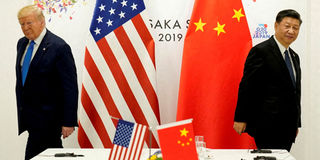
US President Donald Trump attends a bilateral meeting with China's President Xi Jinping during the G20 leaders summit in Osaka, Japan, June 29, 2019.
On January 1, 2019, the International Affairs published an insightful article on: “The Rise and Fall of American Hegemony from Wilson to Trump” by Joseph Nye Jr. Long before President Donald Trump’s world-wide trade wars, the renowned Harvard Professor foretold the end of America's 80-year old global hegemony, arguing cogently that “America’s place in that world may be threatened more by the rise of populist politics at home than the rise of other powers abroad.”
This prediction is coming true. Trump’s “Liberation Day” tariff speech on April 2, 2025, declaring a national emergency — ostensibly in response to what he described as a “large and persistent UStrade deficit” — and imposing a 10 per cent tariff on all imports to the US and even higher tariffs on 60 other countries, has triggered a perfect global trade war.
Besides inflaming the battle for global hegemony between the US and key powerhouses in the Global South — especially China — the trade wars have also inspired a barrage of articles and media headlines proclaiming “the end of U.S. hegemony.” Although the real risk to American hegemony is not China, Trump’s trade wars signals the end of four centuries of a stifling Western global dominance.
The ensuing debate on the future of American hegemony brings to mind the eminent pan-Africanist, W.E.B. Du Bois, who said daringly and correctly that “the problem of the 20th century is the color line.” Dubois was writing at a time when the whole of Africa and much of Latin America and Asia, including China, were under colonialism in all its hues, shades and guises. He was primarily concerned with the pervasive racial discrimination and inequality between the West and the rest, which impeded the progress of the people of the Global South, especially the Africans, and their full participate in global affairs.
In 2025, Colonialism is long gone, and globalisation and technological advancements are rapidly transforming social political landscapes and spurring the rise of an interdependent and interconnected global society. But the problem of the “colour line” endures in the form of the global hegemony and unilateralism of the America-led West. This is the real problem of the 21st century.
Trumpism
We live in a chaotic and anarchic world. Far from re-asserting America’s hegemony, Trumpism — characterised by a new bout of populism, isolation, protectionism and other anti-globalisation trends — is creating a perfect Hobbesian world characterised by disorder, uncertainty and unpredictability.
Trump’s trade wars as a strategy to reassert America’s world hegemony remains the greatest barrier to collective efforts to find solutions to the multiple challenges facing our world today, including wars and conflicts, slow economic recovery, inequality, poverty, food insecurity, pandemics and climate change.
Will the China-led response by countries in the Global South to Trump’s trade wars finally break the hegemonic trap? Chinese and African intellectuals gathered at the Egyptian Suez Canal University on April 16, 2025 projected China-Africa dialogue and solidarity as a pathway to a non-hegemonic, peaceful and prosperous world.
Primarily, this meeting of the mind between the two civilizations is anchored on their highly similar philosophical traditions. From Africa comes the “Ubuntu” (South Africa) and “Harambee” (Kenya) philosophy of “I am because we are”, which speaks to common universal ties that bind all humanity. And from China comes the idea of “yin and yang,” the harmony of opposing but complementary forces, as the core concept and value of Chinese culture that entails coexistence and co-prosperity of global civilizations as opposed to the “clash of civilizations”.
Hegemony and unilateralism
Chinese and African scholars are drawing inspirations and practical lessons from their shared history as an antidote to the global culture of hegemony and unilateralism and to advance the idea of co-prosperity and win-win scenarios in global affairs. The enchanted ancient “Silk Roads” are re-imagined as global spaces where the two civilizations met and exchanged ideas, technologies, goods and services free of hegemony and as equals. This was before both the Chinese and African dreams of free dialogue of civilizations and modernization were differed, cut short by violent occupation by external forces.
China’s Reform and Opening-up Policy from 1978 was a game-changer. In four decades, Chinese-style modernisation enabled China to lift all its people from the clutches of extreme poverty and build the world’s second largest economy, but estimated to be over 20 per cent larger than the US economy in terms of Purchasing Power Parity (PPP) — which accounts for differences in the cost of living and goods.
The lesson for Africa was clear: poverty is not a curse for any civilization! China’s grass-to-grace story has inspired Africa to seek its own path to modernise and industrialise. But Trump’s flat-rate tariffs of up to 25 per cent on key African exports to US is poised to disrupt trade flows and create investment uncertainty.
And what is the roadmap to the future? In modern times, China and Africa are meeting along China's “New Silk Road.” The African Union’s 53 out of 55 member states are involved in the Belt and Road Initiative (BRI), China’s colossal infrastructure investment project. Both BRI and the Forum on China – Africa Cooperation (FOCAC) now form the twin-engines of China-Africa development cooperation. The real game-changer in Sino-Africa dialogue is the Beijing Action Plan (2025-2027) adopted during the 2024 FOCAC summit in Beijing.
The January-March 2025 issues of the Africa Policy Institute’s China-Africa Report currently monitoring the implementation of the Beijing Action Plan show evidence of rapid growth of investments, trade, technology transfer and industrialisation.
Maintaining the momentum in the implementation of the Action Plan, China’s most consequential development deal to Africa, the continent might easily weather the effects of Trump’s global trade wars. Together, Africa and China have a historic mission to slay the dragon of unilateralism and hegemony.
Professor Peter Kagwanja is Chief Executive at the Africa Policy Institute. This article is an except of a paper presented at the international conference on at : “The Modern Value of Classic Wisdom: The Inspiration and Reflection of Ancient Chinese and African Civilizations to Contemporary Global Challenges”, Confucius Institute, Suez Canal University, Egypt, April 16, 2025.










